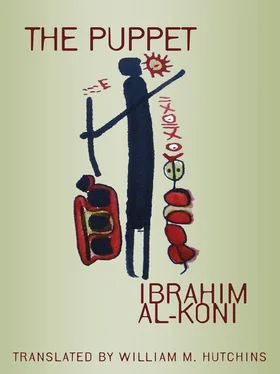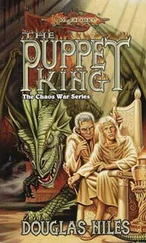Ibrahim al-Koni - The Puppet
Здесь есть возможность читать онлайн «Ibrahim al-Koni - The Puppet» весь текст электронной книги совершенно бесплатно (целиком полную версию без сокращений). В некоторых случаях можно слушать аудио, скачать через торрент в формате fb2 и присутствует краткое содержание. Год выпуска: 2015, Издательство: Center for Middle Eastern Studies, University of Texas, Жанр: Современная проза, на английском языке. Описание произведения, (предисловие) а так же отзывы посетителей доступны на портале библиотеки ЛибКат.
- Название:The Puppet
- Автор:
- Издательство:Center for Middle Eastern Studies, University of Texas
- Жанр:
- Год:2015
- ISBN:нет данных
- Рейтинг книги:3 / 5. Голосов: 1
-
Избранное:Добавить в избранное
- Отзывы:
-
Ваша оценка:
- 60
- 1
- 2
- 3
- 4
- 5
The Puppet: краткое содержание, описание и аннотация
Предлагаем к чтению аннотацию, описание, краткое содержание или предисловие (зависит от того, что написал сам автор книги «The Puppet»). Если вы не нашли необходимую информацию о книге — напишите в комментариях, мы постараемся отыскать её.
The Puppet — читать онлайн бесплатно полную книгу (весь текст) целиком
Ниже представлен текст книги, разбитый по страницам. Система сохранения места последней прочитанной страницы, позволяет с удобством читать онлайн бесплатно книгу «The Puppet», без необходимости каждый раз заново искать на чём Вы остановились. Поставьте закладку, и сможете в любой момент перейти на страницу, на которой закончили чтение.
Интервал:
Закладка:
The herald prepared to spring into action but the nobleman stopped him with a stern gesture of his hand.
The short man replied, “The truth is that we’ve been intellectuals for a long time — wise men from day one.”
“Wretch, to what day do you refer?”
“I’m speaking, master, of the first day, our birthday.”
“Amazing!”
“It’s never good to insult another person.”
“Are you a merchant or a transient?”
“I’m neither a merchant nor a transient.”
“Are you from one of the tribes of vassals?”
“Vassals?”
“The symbol on your head attests to your status as an immigrant or the son of vassals.”
“Symbol?”
“The turban. Only an immigrant or a vassal would tie a veil in this fashion.”
“Does our master see some relationship between turbans and leadership?”
The mob grew restless. Then, feeling emboldened, they laughed openly, loudly, offensively. Their laughter revealed a spirit of derision and Schadenfreude.
______________
1. The Qibli is the south wind, from the desert.
2. Ampelodesma tenax , a low-growing grass.
THE JUDGMENT
1
He set off for a walk through the barren lands.
He emerged from the alleys on the south side of the oasis, crossed the area reserved for caravans, reached the well, and leaned over the stone wall encircling its opening. He was diverted by the trickle of water that continued to flow down a damp ditch with weeds on both sides. He tarried by the irrigation ditch, enjoying the water’s sound as it prattled and raved in its struggle with the ditch’s rock. The watercourse zigzagged east and then turned west before disappearing in thickets of date palms, grapevines, and pomegranates. In a patch of ground between the trees, at the center of a field to the west, the plentiful waters glistened — seditious and naughty in the twilight. He remembered how the tribe had struggled to find this treasure’s location and recalled in detail the day that the beneficent herald had made the rounds repeating the good news. He felt downhearted, however, when he pictured himself clasping in his arms the old well-digger — the earth’s victim — to raise him from the belly of the earth. He had known that the tribe would lose the well-digger. The tribe had also realized beforehand what the well-digger’s fate would be. The well-digger, who was fond of tunnels and who had learned the earth’s secret once he had chosen it for his eternal refuge, himself understood that the day he struck water would be his doomsday. The tribe would not have known he knew had he not confided the matter to his son, who circled the encampment, weeping, before earth’s offspring decided to enter the earth to struggle and search for the treasure.
He would never forget the day he descended to the bottom to pull the man out. He would not forget the enigmatic, mocking look that had settled in the well-digger’s eyes. He would never forget his tunic, which was soiled with blood and dirt moistened by the spring’s water. He would never forget another matter that he had kept from everyone and that remained his breast’s secret even now. When he had removed the piles of gravel, mud, and rock and had felt the victim’s pulse, he had been certain the man was dead. Then, when he had strapped the body to himself — so that the two bodies (the live one and the dead one) cohered into a single creature thanks to the palm-fiber rope — and when he had tugged at the rope to signal to the men to begin hauling them up, at that moment, he had felt warmth course through his partner’s body and had felt with his chest, which was strapped to the victim’s breast, his partner’s heartbeat. That had not been a fantasy, because the necessary pulse continued during the trip from the pit’s bottom to the mouth of the well. He had also clearly felt his partner’s heart stop once light flooded over them and the men’s hands grabbed them. It had happened shortly before the men untied the fiber rope from their two bodies. He had sensed the mysterious rhythm recede and weaken before vanishing. As it disappeared, the warmth in his partner’s body diminished. Their two bodies separated and a fever convulsed him. A fiery tear sprang from his eye and in his heart he felt a thorn’s prick. Then he withdrew at once, fleeing from the group’s din to bury his pain in the wasteland.
2
On the ridge overlooking Retem Valley, a ghostly figure appeared, emerging suddenly from the retem thickets. He walked alongside the other man at a nobleman’s pace, his hands clasped behind him. As if to himself, he said, “It’s not a good idea for a person who has assumed responsibility for a people to walk alone, defenseless.”
His voice was husky, a scarcely audible whisper. Although erect, he was leaning forward. Like a wayfarer long separated from other people, he searched the stone monoliths, which were flooded by twilight’s rays, for a nameless sign. Recluses do not look their companions in the eye and pay no heed to their associates. They shoot past people without noticing their existence. They are, however, a breed fascinated with observing the bodies that unite again at the eternal horizon, even though the tribes perceive these to be inanimate objects or the wasteland’s emptiness. Recluses hunt for a prophecy in wayside objects and spy on the Spirit World’s inhabitants, who do not show themselves to other human beings. Perhaps for these reasons, the desert’s tribes are accustomed to regarding members of this enigmatic community as creatures who always provoke debate, doubts, and suspicions.
Watching with curiosity, he asked, “Is my wasteland companion a stranger from the Spirit World’s tribes or a human being from a nomadic family?”
His companion replied with an alacrity that desert people would not have thought typical of nomads or of the denizens of the Spirit World, “Don’t they amount to the same thing? Don’t communities lose their distinguishing characteristics as dusk falls?”
“You’re right. We say that too. But I can affirm I’ve never seen you before, despite … despite my intuition to the contrary.”
“Now you deny with your tongue a matter you first thought certain.”
“You’re right. The veil confuses the matter for every eye. Thus even the most perspicacious people cannot affirm categorically that the person seen today is the same man they sat with yesterday. That happens whenever the distinctive signal provided by headgear changes.”
“But wise men cannot perceive the identity of a creature who hasn’t wrapped a veil round his head.”
“That’s most amazing.”
“During raids, combatants deliberately fasten veils to fallen comrades’ faces to distinguish their own fatalities from the enemy’s.”
“That’s most amazing.”
“A son of the desert emerges veiled from his mother’s belly. So how would you expect the veil not to become a member of his body like his hand, shoulder, or arm? How could the veil not become one of his identifying features?”
“Is this why some tribes treat it with veneration akin to their respect for the Spirit World?”
“You said ‘some tribes.’ You really ought to say ‘all tribes.’ I don’t know even one clan that doesn’t worship this rag.”
“Forgive me for this slip of the tongue, because the fact is that the best people of our tribe also venerate it; so much so that a group of them almost erects idols to it and offers blood sacrifices for it.”
“I’m not surprised to hear this from my master’s mouth, because I know in another desert another tribe that inherited from their ancestors a religious festival that honors the veil. During it they slaughter sacrificial animals, warriors race camels, and young women sing the noblest melodies. On this day, each year, there is a contest for the best-looking veil.”
Читать дальшеИнтервал:
Закладка:
Похожие книги на «The Puppet»
Представляем Вашему вниманию похожие книги на «The Puppet» списком для выбора. Мы отобрали схожую по названию и смыслу литературу в надежде предоставить читателям больше вариантов отыскать новые, интересные, ещё непрочитанные произведения.
Обсуждение, отзывы о книге «The Puppet» и просто собственные мнения читателей. Оставьте ваши комментарии, напишите, что Вы думаете о произведении, его смысле или главных героях. Укажите что конкретно понравилось, а что нет, и почему Вы так считаете.












